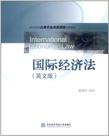国际经济法
出版时间:2011-9 出版社:盛建明 对外经济贸易大学出版社 (2011-09出版) 作者:盛建明 页数:596
内容概要
An Overview of the WTO Legal System、The Evolution of the GATT Legal System、An Overview of the WTO Legal System、Contributions Made by WTO to the Multilateral Legal System、Basic Principles of the WTO、Applicability of WTO Rules、Prospects of the Doha Round等。
作者简介
盛建明,法学博士,对外经济贸易大学法学院教授、博士生导师,WT0法律研究中心主任,中国国际经济法学研究会常务理事,曾任北京市人民政府法律专家顾问、北京环中律师事务所反倾销部副部长等。主要讲授课程有:国际经济法、反倾销法、贸易管制法等。2005年荣获对外经济贸易大学首届青年教师基本功大奖赛冠军和最佳教案奖。主要学术专著有:1994年出版的《反倾销国际惯例》是我国关于介绍和研究反倾销法的最早的专著之一;2000完成美国证券评级机构的法律责任的系统深入的研究,并通过博士论文答辩,于2005年出版《美国证券评级机构的法律责任》,该书比西方学者对证券评级机构责任问题的研究成果要早发表3至4年,被我国法学界前辈沈达明教授誉为填补该领域世界学术空白之作。此外,作者近年来在《中国法学》、《国际贸易问题》、《国际贸易》等刊物发表了关于国际经济法,特别是WTO法的一系列文章。作者曾于2003年受商务部委托,完成了多哈回合贸易规则美国谈判立场的科研项目,并在此基础上为我国政府提交了两份代表我国政府在贸易规则谈判方面立场的两份英文提案草案,一份题为《关于反倾销调查中因果关系确定原则的澄清》,另一份题为《关于延长绿灯补贴之提案》。此外,在中国政府参加的第一起利用WTO争端解决机制保护我国贸易利益的案件,即美国201钢铁保障措施案件中,作者作为环中律师事务所律师负责起草的关于“中国应享有发展中国家待遇”的2万余字英文材料,体现了其深厚的贸易法功底,此案最后以包括中国在内的全体申诉方的胜诉而告终。
书籍目录
PART 1 INTRODUCTIONChapter 1 An Overview of International Economic Law (IEL)Section 1 An Conceptual Analysis of IELSection 2 The Scope and Coverage of IELSection 3 Features of IEL[ Readings and Exercises ]Chapter 2 Economic Globalization and New Development of IEL Section 1 Conceptual Definition of Economic GlobalizationSection 2 Features of World Economy under the Context ofEconomic GlobalizationSection 3 New Development Trends of IEL[ Readings and Exercises ]Chapter 3 Legal Sources of IEL[ Readings and Exercises ]Chapter 4 Basic Principles of IEL[ Readings and Exercises ]PART 2 INTERNATIONAL TRADE REGULATIONChapter 5 An Overview of Legal System Regarding Trade RegulationSection 1 A Review on Theories of International Trade Regulation andCorresponding Trade PoliciesSection 2 The Evolution of Trade Regulatory Measures at NationalLevel and Categories of Trade Regulatory Measures[ Readings and Exercises ]Chapter 6 An Overview of the WTO Legal SystemSection 1 The Evolution of the GATT Legal SystemSection 2 An Overview of the WTO Legal SystemSection 3 Contributions Made by WTO to the Multilateral Legal SystemSection 4 Basic Principles of the WTOSection 5 Applicability of WTO RulesSection 6 Prospects of the Doha Round[ Readings and Exercises ]Chapter 7 Anti-Dumping LawSection 1 An Overview of Anti-Dumping LawSection 2 Substantive Rules of Antidumping LawSection 3 The Procedural Rules of Antidumping ActionsSection 4 Anti-Circumvention Actions[ Readings and Exercises ]Chapter 8 Legal System on Subsidies & Countervailing MeasuresSection 1 An Overview of the Legal System on Subsidies &Countervailing MeasuresSection 2 Major Legal Sources of Subsidies and Countervailing MeasuresSection 3 A Detailed Introduction and Interpretation of ASCM[ Readings and Exercises ]Chapter 9 Legal System on Safeguard MeasuresSection 1 An Overview of Legal System on Safeguard MeasureSection 2 Major Legal Sources of SafeguardSection 3 A Detailed Analysis of the ASGSection 4 China-specific Safeguard Mechanism[ Readings and Exercises ]……PART 3 LEGAL SYSTEM ON INTERNATIONAL INVESTMENT REGULATIONPART 4 LEGAL SYSTEM ON INTERNATIONAL FINANCIAL REGULATIONPART 5 LEGAL SYSTEM ON INTERNATIONAL TAXATIONPART 6 LEGAL SYSTEM ON THE SETTLEMENT OF REGULATION-RELATED INTERNATIONAL ECONOMIC DISPUTES
章节摘录
版权页:插图:Second, in order to ensure safety of overseas investment made by their own nationals,many developed countries tend to respectively conclude bilateral treaties or agreements with developing countries that absorb foreign investment on the mutual protection of investments made by nationals of the other party. At the same time investment insurers established by governments of developed countries (such as the Overseas Private Investment Corporation, or OPIC, set up by US Government) usually conclude insurance contracts with their own investors that invest overseas to insure political risks related to such overseas investment.Upon occurrence of risk incidents covered by such insurance, these insurers will pay claims as stipulated in the contract and then replace the insured's legal status as the creditor and exercise their subrogation rights to claim, from the host country government. To prevent the host country government from refusing to pay claims afterward, the developed countries incorporate special provisions into their bilateral treaties or agreements with the host countries about mutual protection' of investment by their respective nationals to constrain the host country governments, i.e., stipulating that the host country gvernments agree that the foreign investment insurers enjoy the rights of subrogation.
编辑推荐
《国际经济法(英文版)》收录了最新法律问题。
图书封面
评论、评分、阅读与下载
用户评论 (总计3条)
- 正版书,内容还是很丰富,老师强烈推荐这本书,原滋原味的英语教程。。。
- 盛老师写得很用心,内容全面,语言简洁,非常推荐!!!!!!
- 很方便购买,也很实惠
推荐图书
- 经典闲读
- 一莲如舟
- 制服ボーイズ 「正しい王子のつくり方」公認ビジュアルブック
- 仮面ライダーWキャラクターブック「悪魔と相乗り」
- 玄珠录校释
- 儒家的天论
- 普通高中课程标准实验教科书
- 三代豊国・初代広重双筆五十三次
- 模糊数学导论
- 天然气地面工程技术与管理
- 信息检索相关性判据及应用研究
- JavaEE架构与程序设计
- 中国科学院研究生院2012年攻读博士学位研究生招生专业目录
- 海洋溢油污染应急技术
- 电子产品生产工艺与管理项目教程
- 汽车机械制图
- 提升情商和社交商的36堂课
- 软物质力学进展
- 2012年考研英语全真冲刺试卷
- 留学中国--汉语综合教程练习册2
- 360o世纪金榜教材解读方略
- 城市特种作战
- 永生
- 李学峰得法廔艺术卷一
- 这样做才能教出好成绩
相关图书
- 进入社会的50堂人脉课
- 手针疗法临床应用
- 乔比涂鸦书(套装共4册)
- 是谁把太阳叫醒的
- 中国画教学大图典
- 高等院校美术教育专业教材·中国画教学大图典
- 硬笔书法艺术
- 慷慨三湘
- 叶永烈文集(全二卷)
- 叶永烈文集
- 放慢 放松 放下
- 童年
- 培根随笔全集
- 金融科研谱新篇
- 职场的100条法则
- 走向名校-小升初考前集训.数学
- 走向名校-小升初考前集训.语文
- 中国就像棵大树
- 年轻时做新鲜事/悦读季名家经典
- 从一个微笑开始/悦读季名家经典
- 万水千山走遍/悦读季名家经典
- 百分百垂钓高手
- 鲁迅社会影响调查报告
- 这才叫服务
- Gossie and Friends Board Book Gift Set 小鹅戈西与她的朋友们礼盒套装
